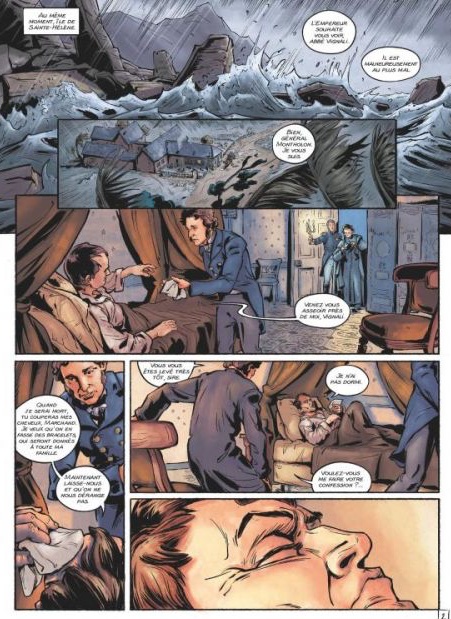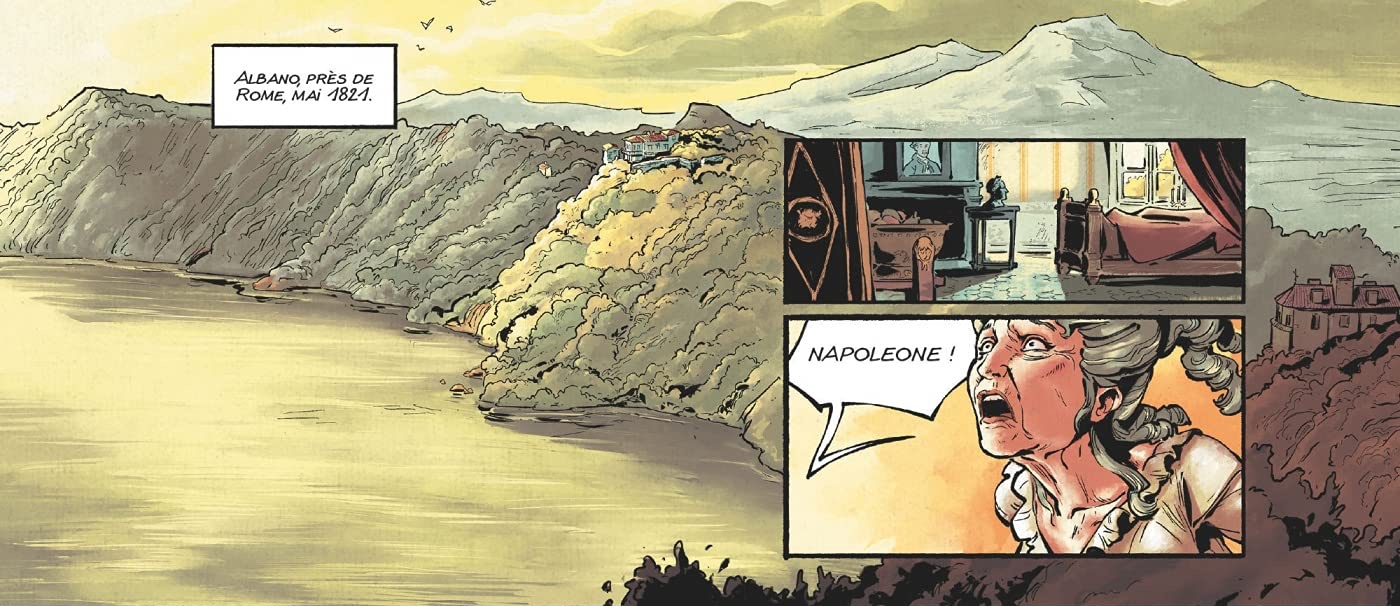History would be made by great characters. However, while biographies of kings, queens and soldiers populate the shelves of bookstores, popes seem absent. Will this volume on Pius VII give the lie to this impression?
Placing the Church at the heart of history
 This volume on Pius VII is part of the collection Un pape dans l'histoire co-published by the publisher Glénat, a specialist in comics, and Le Cerf, oriented towards Catholic publishing. Through the figures of several leaders of the Catholic Church, this collection makes us rediscover the history of the Western world. To obtain great historical accuracy, Bernard Lecomte, a writer specializing in political and religious history, ensures the expertise of each volume. When we see the program, we are of course far from the Terrible Pope and Borgia scripted by Alejandro Jodorowsky where he described the perversion in the Vatican between the end of the fifteenth and the beginning of thesixteenth century. Pius VII is not a laborious history lesson because the screenwriter Philippe Thirault injects into this volume of the adventure. It is Bonaparte on his deathbed who is the narrator. He wanted to confess to Father Vignali by recounting his tumultuous relations with Pope Pius VII. We also discover the complex political intrigues between the Emperor of Austria and an Italian group during the election of a new pope. As is often the case, the preferred candidate is not the one who will sit in the Vatican. Once pope, Pius VII gently but firmly sought to assert his independence from the powerful neighboring empires of Austria and France. In parallel, images show the military and political rise of the emperor and his fall.
This volume on Pius VII is part of the collection Un pape dans l'histoire co-published by the publisher Glénat, a specialist in comics, and Le Cerf, oriented towards Catholic publishing. Through the figures of several leaders of the Catholic Church, this collection makes us rediscover the history of the Western world. To obtain great historical accuracy, Bernard Lecomte, a writer specializing in political and religious history, ensures the expertise of each volume. When we see the program, we are of course far from the Terrible Pope and Borgia scripted by Alejandro Jodorowsky where he described the perversion in the Vatican between the end of the fifteenth and the beginning of thesixteenth century. Pius VII is not a laborious history lesson because the screenwriter Philippe Thirault injects into this volume of the adventure. It is Bonaparte on his deathbed who is the narrator. He wanted to confess to Father Vignali by recounting his tumultuous relations with Pope Pius VII. We also discover the complex political intrigues between the Emperor of Austria and an Italian group during the election of a new pope. As is often the case, the preferred candidate is not the one who will sit in the Vatican. Once pope, Pius VII gently but firmly sought to assert his independence from the powerful neighboring empires of Austria and France. In parallel, images show the military and political rise of the emperor and his fall.
Pope vs Emperor
Pius VII is an extraordinary pope. He began his career as a simple monk but, through his exemplary life and intense work, he acceded to the throne of St. Peter in 1800. To illustrate his respect, he takes the name of his predecessor. But this shy and traditional man will have to face the emergence of a new world embodied by Napoleon Bonaparte. Europe was indeed shaken by the upheavals that followed the French Revolution. It is this pope that we see on the famous painting of the coronation of Napoleon. It was also following this event that the relationship between the two men deteriorated causing strong tensions between the France and the Vatican.  The screenwriter Philippe Thirault chooses to follow the relationship between these powerful to highlight the life of the pontiff. We follow the complicated childhood and strangely close to everyone. However, as Napoleon entered the military school, Brother Gregory became a Benedictine monk. He is a man open to his time having read the Encyclopedia and then met Condillac. Appearing to have no other ambitions than to serve God, each promotion is offered to him. His election as pope seems to be the work of providence and his political predictions are divination. Having become a cardinal, he put his life on the line to avoid the ferocious repression of the French army and gave his salary to the poor. Without training, he proved to be a shrewd politician. Nevertheless, it was not until the last pages that his anti-Judaism was notified. On the other hand, the screenwriter draws a portrait of the emperor. A megalomaniac, he wants his hair to be used to make bracelets for his family once he dies. His victorious campaign in Italy is proof of his all-consuming personal ambition and contempt for human life or the ecclesiastical hierarchy despite being a Christian. By limitless Machiavellianism, the emperor does not keep his promises. This very effective opposition in the book making it easy to follow would nevertheless have deserved more nuances. Released in the bicentenary year of Napoleon's death, Pius VII is a hagiography of one of the few men who managed to oppose the emperor and, moreover, without violence. The reader will come out enriched with knowledge by the comic strip as well as the documentary file at the end. If he is wise, he will have the prudence to supplement his reading with other sources to have a more nuanced vision of Pius VII. If the links between comics and history intrigue you, you will find on these links a text on propaganda in comics and a social thriller in Los Angeles.
The screenwriter Philippe Thirault chooses to follow the relationship between these powerful to highlight the life of the pontiff. We follow the complicated childhood and strangely close to everyone. However, as Napoleon entered the military school, Brother Gregory became a Benedictine monk. He is a man open to his time having read the Encyclopedia and then met Condillac. Appearing to have no other ambitions than to serve God, each promotion is offered to him. His election as pope seems to be the work of providence and his political predictions are divination. Having become a cardinal, he put his life on the line to avoid the ferocious repression of the French army and gave his salary to the poor. Without training, he proved to be a shrewd politician. Nevertheless, it was not until the last pages that his anti-Judaism was notified. On the other hand, the screenwriter draws a portrait of the emperor. A megalomaniac, he wants his hair to be used to make bracelets for his family once he dies. His victorious campaign in Italy is proof of his all-consuming personal ambition and contempt for human life or the ecclesiastical hierarchy despite being a Christian. By limitless Machiavellianism, the emperor does not keep his promises. This very effective opposition in the book making it easy to follow would nevertheless have deserved more nuances. Released in the bicentenary year of Napoleon's death, Pius VII is a hagiography of one of the few men who managed to oppose the emperor and, moreover, without violence. The reader will come out enriched with knowledge by the comic strip as well as the documentary file at the end. If he is wise, he will have the prudence to supplement his reading with other sources to have a more nuanced vision of Pius VII. If the links between comics and history intrigue you, you will find on these links a text on propaganda in comics and a social thriller in Los Angeles.


















